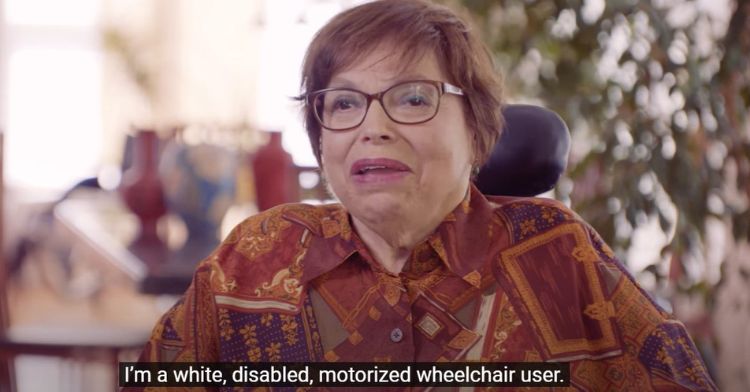Written by Marty Townsend, InspireMore and Melange AccessibleTidbits, December 12, 2023

Share this:
- Click to share on Facebook (Opens in new window)
- Click to share on Twitter (Opens in new window)
- Click to share on Pinterest (Opens in new window)
Suffering polio at 18 months old sent Judith Heumann on the path of a lifetime. Polio left Judy Heumann with classification as a quadriplegic in 1949. Although she had some use of her arms and legs, she was permanently disabled. Growing up in New York, life was difficult. Every day was a fight to move around her neighborhood of East Flatbush. There was nothing even remotely resembling disability rights during her childhood.
Many buildings were not wheelchair-accessible. Civil rights came around, but they didn’t include persons with disabilities. When it came time for young Judy to begin school, she was denied entry to P.S. 198. Their problem with this bright young lady? She was a “fire hazard.” Yes, the principal determined that she would be a hazard in the building in the event of fire because of her wheelchair. So, from an early age, Judy knew if she wanted a life like non-disabled people (that is, those of us who don’t have disabilities), she would have to fight for it. And fight she did!

Judy’s Advocacy Was Unrelenting
Judy Heumann is the “mother of the disability rights movement.” Her days of joining her family in the fight for access to schooling became the fight for the accommodations specified within the Americans with Disabilities Act. You would be here reading all day if we told you everything Judy had a role in (you can read the whole story in her book, “Being Heumann: An Unrepentant Memoir of a Disability Rights Activist“). We did compile a condensed list:
- Advocated for the Rehabilitation Act, including Section 504 prohibiting discrimination in federally-funded programs
- Strong advocate for the Disabilities Education Act
- Instrumental in the passing of the Americans with Disabilities Act (ADA)
- Led protests and sit-ins to promote change for disabled Americans
- Mentored people with disabilities
- Was a Camp Counselor at Camp Jened, aka “Crip Camp“
- She was honored by Time Magazine as one of history’s top 100 female leaders (she is #4)

Evidence Of Judy’s Fight For Disability Rights Is Everywhere
You methods of accessibility in place in your day-to-day life because of Judith Heumann and her never-ending battle for disability rights. Handicapped ramps? Yep. Elevators in the subway? Yep. Power-assisted doors leading into public buildings? Yep. Accessible schools? Yep. Wider aisles in supermarkets? Yep. Ramps in public parks? Yep. If there is an accommodation in place for disabled members of society, you can be pretty sure that the actions of Judy Heumann led to its implementation.

But these accommodations don’t just help people with disabilities. In the subway, Judy mentions the number of parents with strollers who use the elevators. The accommodations implemented because of the ADA help many people without disabilities. Judy’s stamp is on every part of our lives, whether disabled or non-disabled. Assistant Attorney General Kristen Clarke of the Justice Department’s Civil Rights Division said, “She was a true force for change and because of her, our expectations for the kinds of lives that people with disabilities live have changed dramatically.”
Remembering Judy Heumann: Continuing The Fight For Disability Rights
Sadly, Judith Heumann passed away on March 4th, 2023, at 75. She leaves behind a legacy of change. On that change, she once said, “Change never happens at the pace we think it should. It happens over years of people joining together, strategizing, sharing, and pulling all the levers they possibly can. Gradually, excruciatingly slowly, things start to happen, and then suddenly, seemingly out of the blue, something will tip.”
And tip it did. As we continue the fight for disability rights, stop and give a quick and quiet nod to this little powerhouse of a woman who fought for everyone with any disability. We’ll leave you with a short video (it is 6 minutes long) that encapsulates the life of Judy Heumann, produced after her death by the Ford Foundation. Some language might be NSFW, as Supreme Court Judge Ruth Ginsberg addresses Judy using a familiar phrase associated with her unrelenting press for equality at the seven-second mark. Please share this with your friends so they can rally with us to celebrate Judy’s legacy.
